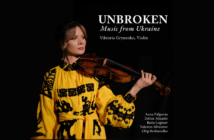REVIEW/PROFILE: of the Opera Saratoga 2018 mainstage production season: Franz Lehar’s The Merry Widow, David T. Little’s and Royce Vavrek’s Vinkensport, Gareth Williams’ and Anna Chatterton’s Rocking Horse Winner, and Gian Carlo Menotti’s The Consul; at the Spa Little Theater, Saratoga Springs, New York, through July 15.
You’ve still got all of August for those good pulpy beach reads. Why not set aside a bit of July to savor a different delectus of juicy plotlines during the all too brief lyric holiday afforded by Opera Saratoga’s summer 2018 season, running only through July 15?
This year’s programming is (almost) completely in English – barring a stray Belgian phrase here, some character-specific snatches of Italian there, and one off-menu number served up in delicious German. It’s varied, engaging and entertaining material, balanced evenly between comic and dramatic, and bundled in three discrete production packages – a Viennese operetta, a double bill of 21st-century chamber pieces, and a new production of a lauded mid-20th-century masterwork – and all knit through with strong thematic bonds of memory, home, displacement, and reinvention.
Do I Hear a Waltz?
Opening the season was a new, English-language production of Franz Lehar’s beguiling confection, The Merry Widow (viewed at the opening on June 29; with additional performances on July 1, 8 and 13).
Premiered in Vienna in 1905, this is Lehar’s most famous work, if not the most outright beloved specimen of the entire belle-époque operetta genre. With its texture of deft satire, frothy romance, and disarmingly canny human insight, it rates by many estimations above even that intoxicating (if narratively woozy), unregenerately “decadent” earlier chestnut, Die Fledermaus (by Johann Strauss the younger).
And the music! Lehar’s score is a festival of witty character novelty, glowingly nostalgic ballade (i.e., the exquisite Act II “Vilja” for the operetta’s leading lady), soaring and unapologetically romantic rhapsody, and infectious dance rhythms, all crowned by that central waltz melody – delicate, haunting and unforgettably evocative of the operetta’s burnished, bittersweet, bygone world. (Conductor Antony Barrese consistently coaxes gorgeously seductive strains from his orchestra, along with those stylistically perfect, heart-stopping Viennese rhythmic suspensions.)
But … on closer inspection, perhaps not everything is rose-glow and smiles of a summer evening after all.
“It was a time of a lot of change,” remarks the production’s director and choreographer, John de los Santos. “There are several references in the text to the suffragette movement.” (Portions of the Anglosphere had already given women the vote – Australia in 1902 and New Zealand as early as 1893 – and women in continental Europe had taken note.) “Sexual politics were changing as well as governmental politics. Ideas were shifting about relationships between men and women, and that’s what I wanted to explore.”
Hence, the entire production, with its sweeping staircase and Gilded-Age accoutrements, is set within a seductively curvaceous art nouveau conch shell of decidedly Freudian redolence, with the face of a serenely bemused Eternal Feminine peering down on the mortal proceedings, her golden pre-Raphaelite tresses rambling luxuriantly into infinity. (The lovely and resourceful set designs for the entire 2018 Opera Saratoga season are by Cameron Anderson.)
The operetta’s principal plot, of course, revolves around the Parisian exploits of a wealthy young widow, Hanna Glawari, on extended holiday from her mythical Eastern European homeland, the Duchy of Pontevedro. Presumed to be scouting husband number two, Hanna’s actual design is to penetrate the defenses of the cynical Pontevedran Count Danilovitsch who many years ago wooed her, then abandoned her. Hanna is determined to rekindle the romance and get Danilo to confess his abiding love.
Subplots abound, with bumbling Pontevedran consular officials conspiring to repatriate Hanna’s fortune while two-timing aristocratic wives hoodwink their husbands left and right. Men are the universally uxorious fools in this Merry Widow, with women the mistresses of the universe – a giddy and subversive redress: latter-day Lehar retrofitted for the #MeToo era.
The production brims with energetic performers, some taking extravagant advantage of the wide comic berth de los Santos affords them, such as baritone Andy Papas, who mugs with outlandish self-assurance as the cuckolded petty official, Baron Mirko Zeta.
By contrast, dizzying heights of romantic extravagance are achieved by the illicit young lovers Camille de Rosillon and Valencienne, played by tenor Scott Quinn and Young Artist soprano Megan Pachecano, respectively; while the operetta’s principal couple provides the greatest and most welcome grounding of emotional subtlety, with elegant baritone Alex Lawrence striking just the right register of sonorous leading-man bravado as Count Danilovitsch and, in the title role, luminous soprano Cecilia Violetta López spinning out gorgeous tones while conquering the hearts of suitors and audience alike.
“It’s my first major English-language role,” López confides, “and though I grew up bilingual in English and Spanish, the Romance languages – Spanish and Italian and French – just come more easily when I sing.” To add to the challenge, de los Santos and conductor Barrese have interpolated an eleventh-hour star turn aria for López, “Meine Lippen, sie küssen so heiß,” lifted from Lehar’s final work, the quasi-grand opera Giuditta, and sung in the original German.
“It was a bit of a struggle,” López says. “And a huge discovery!” It’s telling and touching modesty from an artist of consummate skill and enormous charisma. López makes the impossible look effortless, and any language sound enchanting.
The Sporting Life
The second production at Opera Saratoga 2018 is a double bill comprising two unusual takes on the darker side of gaming and competition.
Kicking off the program is an eccentric operatic curtain-raiser entitled Vinkensport (or The Finch Opera) by American composer David T. Little and Canadian-born librettist Royce Vavrek. Essentially a tapestry of sung soliloquies, the work’s title derives from an ancient and unusual Belgian-Flemish pastime in which competitors try to elicit the greatest concentration of distinctive melodic motives (each called a “susk-e-wiet”) out of their pet finches within a given hour.
Staged like a secular oratorio, the six characters – a coterie of offbeat amateur bird trainers ranging from a vulgar, bibulous, and oversexed harridan ripe for a run on the Real Housewives of Antwerp, to an angry, hoodied goth youth with serious father issues – are posted at what could pass as a row of Sukkot booths along the lip of the stage. Each holds a boxed finch that he or she hopes to egg on to victory, and the group sings in turn about the hopes and fears, lusts, longings, and hang-ups that animate them. And while the competition itself isn’t very clearly dramatized, and the modicum of interaction and development among the characters is ultimately enigmatic, one does gain gradual, ironic appreciation for the contrast between the emotional arrest of this sorry human aviary on the one hand, and the unself-conscious nature songs of their tiny captive avatars on the other.
Vavrek’s libretto (like that of his 27, JFK and Breaking the Waves) is typically furnished with interestingly off-center thought bubbles, while Little’s music (here in an 8-instrument reduction from the work’s original 2011 orchestral score) is varied, efficient, accessible and vocally well-adapted.
The cast, composed entirely of members of Opera Saratoga’s 2018 Young Artists Program (tenor Quinn Bernegger, soprano Kelly Glyptis, baritone Garrett Obrycki, soprano Megan Pachecano, soprano Christine Suits, and baritone John Tibbetts), is in terrific voice, and offers enthusiastic, imaginative and detailed character studies in director Michael Hidetoshi Mori’s neat staging, while the chamber group conducted by David Allen Miller is spot on.
Horse Play
Vinkensport is followed by the evening’s heftier offering – a longer one-act chamber opera entitled Rocking Horse Winner by Irish composer Gareth Williams and Canadian librettist Anna Chatterton.
While ostensibly concerned with the very Saratoga-appropriate theme of horse racing, Rocking Horse Winner is really something else – a combination psychological study, dysfunctional family tragedy, and sort of haunted house yarn. Based on a D.H. Lawrence short story (later made into a 1949 British film with John Mills), the tale is set in an early 20th-century household in which a widowed mother, Alva, lives a life of grim and morbid regrets about lost youth, lost opportunities and, most of all, lost affluence – grievances that haunt Ava’s developmentally challenged son, Paul, who becomes obsessed with acquiring “money,” a concept he little understands other than as the mysterious medium through which he might see his mother smile again.
By strange chance, Paul develops a singular knack: when in the raptures of riding his nursery room hobby-horse, he is able to predict the winning horse of any upcoming race. It’s a skill of which the boy’s uncle, Oscar, and caregiver, Bassett, take full advantage, amassing a small fortune, which, at Paul’s insistence, they agree to share with Ava. But it seems that money can’t buy her happiness after all. Paul’s hopes thus dashed, the opera takes its final, tragic turn. Call it the wages of wagering.
Williams’ music for Rocking Horse Winner, both vocal and instrumental, is driving, rhythmic, minimalist, and hypnotic, while Chatterton’s libretto is fluent, elegant and full of subtle mystery. The performances in this Opera Saratoga American premiere are uniformly impressive, with Young Artists Program soprano Christine Suits bringing rich, glowing empathy to the role of the vain, emotionally crabbed Ava. Tenor Scott Quinn is dapper and robust-voiced as Uncle Oscar, and Young Artist Sean Galligan brings a potent, coiled baritone to the role of Bassett. The four Young Artists portraying the ghosts of the house’s happier, better-heeled days (soprano Asleif Willmer, mezzo-soprano Christina Scanlan, tenor Zachary Barba, and baritone Chauncey Blade) are all fully-engaged, fine-voiced singing actors.
Finally, tenor Tyler Nelson lends vaulting, throbbing purity of voice to an ingeniously devised portrayal of Paul as a jittery, ardent, and damaged naïf.
Stage director Mori and conductor Miller deliver a finely paced and transparent rendering of this provoking and enigmatic piece. Kudos, too, to those responsible for the inventive conceit of super-sized magic lantern images of horses moving around the entire auditorium, lending immediacy, excitement, and a touch of magical realism to the racing sequences.
(Both Vinkensport and Rocking Horse Winner were viewed at the Saratoga opening on June 30; additional performances: July 6 and 13.)
You Wait Right There!
Premiering in 1950, The Consul was composer-librettist Gian Carlo Menotti’s first major opera, and arguably his best. A dark and dramatic lyric gem, forged amidst the stresses of Cold War anomie and anxiety, the work dramatizes the excruciating psychological and bureaucratic gauntlet run by a doughty young woman, Magda Sorel, desperate to escape an unspecified (evidently Eastern European) police state and reunite with her freedom-fighter husband. Her one hope lies in securing a consular visa for emigration to an unspecified Western nation – presumably the United States. The opera toggles between scenes of Magda’s bleak home life, where she, her mother-in-law, and infant child are under constant surveillance and secret police regularly intrude at will, and scenes in a purgatorial waiting room where Magda and a desolate company of other applicants sit marooned in forlorn hope of someday seeing the Consul.

Meghan Kasanders (MAGDA SOREL), Robert Wesley Mason (JOHN SOREL), and Deborah Nansteel (MOTHER) in THE CONSUL; photo by Gary David Gold
It is interesting that, while the brutality of the police state is amply depicted and deplored, the opera’s real target seems to be the dehumanization wrought by otherwise benign officialdom. Magda’s most gut-wrenching vocal exertions are deployed in passionate jousts with the paper-pushing and rules-obsessed consular secretary, prompting perhaps the opera’s most famous aria: “To this we’ve come [that men withhold the world from men].” Though writing nearly 70 years ago, Menotti seems to have anticipated the radical utopian clamor for “open borders” raised in certain quarters today
Politics and polemics notwithstanding, however, Menotti is nothing if not an incisive man of the theater. Heavy-going as its narrative may be, The Consul maintains interest by expertly varying highly wrought drama with sequences of touching introspection, unexpected levity, and even surrealism. Along with sweeping echoes of Puccini, one finds something of the existential absurdity of Samuel Beckett, the dark hypnagogia of Franz Kafka, and even the epic protest impulse of Bertolt Brecht.
Opera Saratoga executive and artistic director Lawrence Edelson has directed this production with a sure hand and a well-tuned ear for all of the work’s daring, sometimes saltatory leaps among domestic melodrama, Freudian dream sequence, and vaudeville pastiche, and he is well allied with conductor Andrew Bisantz, who brings polish and nuance to Menotti’s eloquent and innovative score.
The production assembles a formidable cast. Baritone Robert Wesley Mason is thrilling as the firebrand freedom fighter John Sorel. Mezzo-soprano Deborah Nansteel brings a voice of supple warmth and great emotion to the role of Mother Sorel. Tenor Tyler Nelson deploys his clarion vocalism – and a very accomplished display of legerdemain (reportedly coached by director Edelson, who is himself an inveterate sleight-of-hand enthusiast) – to the showstopping cameo role of magician Nika Magadoff. Mezzo-soprano Jennifer Panara lends exquisite shading and subtlety to the role of Magda’s pivotal foil, the Secretary. And dramatic soprano Meghan Kasanders is an unmitigated triumph in the demanding, towering role of Magda. Kasanders’ vocal performance surely rates as among the finest realizations of this signal tragic character in the American operatic canon.
(The Consul was viewed at its Opera Saratoga opening on July 7; additional performances: July 9 and 15).
For the Record…
This summer also marks the milestone release of a live recording of Opera Saratoga’s 2017 production of Marc Blitzstein’s seminal 1937 protest opera, The Cradle Will Rock. Directed by Edelson and conducted by the great John Mauceri, this recording features an excellent ensemble cast, and is the first major commercially available live recording of the work with Blitzstein’s full, original orchestrations. At the performances viewed here, CD’s were on discounted sale in the Spa Little Theater lobby; the recording is also available on Amazon and elsewhere.
Opera Saratoga performs in and around Saratoga Springs, New York, with its mainstage productions presented at the Spa Little Theater, 19 Roosevelt Drive, Saratoga Springs, NY. Additional information on the Opera Saratoga 2018 season, which includes other special programming besides the three mainstage offerings profiled above, can be found at http://www.operasaratoga.org/





















